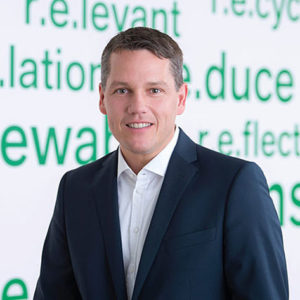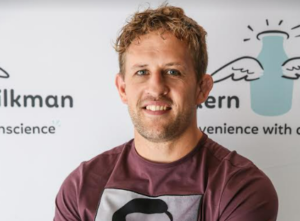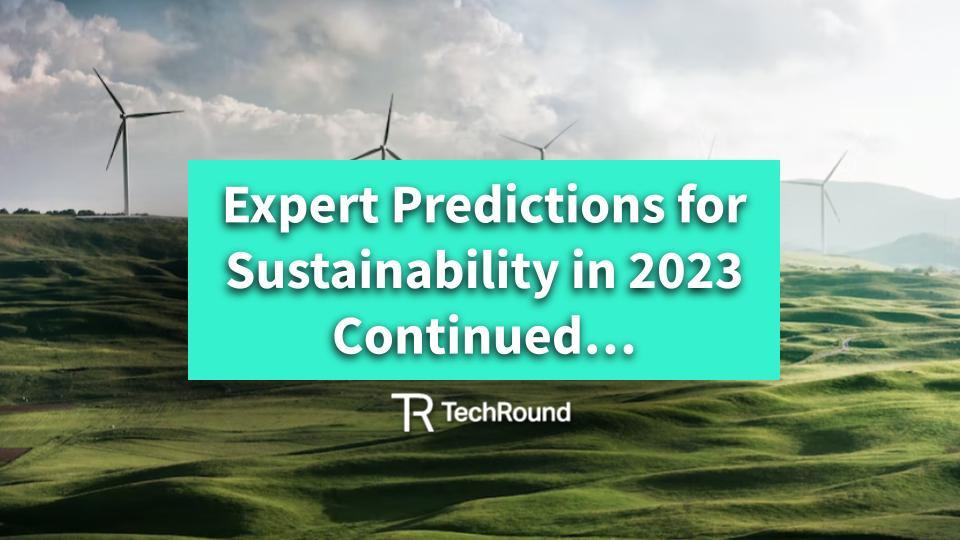We’ve collected industry expert predictions for the future of sustainability in 2023.
As the climate crisis worsens, governments and businesses alike are being asked to spearhead efforts in reducing carbon emissions and developing sustainable practices.
We’ve asked a panel of experts to provide their predictions on sustainability in 2023.
Our Panel of Experts
-
- Peter Windischhofer, Co-Founder & CEO at refurbed
- Joe Dunleavy, Head of Innovation at Endava
- Mohan Naidu, UK Managing Director at FPT
- Daphna Nissenbaum, CEO and Founder at TIPA
- Frank Jessel, Global Director of Solar Trade, BayWa r.e.
- Christine McKie, MD at px Energy Solutions
- Lisa Conibear, Commercial Director at Zoomo Global
- Anna Krotova, Director of Sustainability at Mambu
- Matt Moreland, Sustainability Director at Pura
- Anna Weston, Head of Development in UK & Ireland at Treedom
- Isaac Conrad Ricciardi, Co-Founder at Vitæ
- James Seear, Co-Founder at Spring
- Julien Tremblin, General Manager at TerraCycle Europe
- Simon Mellin, CEO and Founder at Modern Milkman
- Dr Stephen Wise, Chief Strategic Development Officer at Environmental Biotechnology Business, Advetec
- Pete Hutton, Executive Chair at Xampla
- Henrik Langeland, CEO at Enode
- James Lynn, Co-Founder at Currensea
- Steve Watson, Head of Policy & Research at Cushon
- Mauro Cozzi, Co-Founder and CEO at Emitwise
- Jordan Fletcher, Investment Lead, Innovate UK KTN
- Luke Patterson, Analyst at EthicsGrade
Peter Windischhofer, Co-Founder & CEO at refurbed

“Consumer demand for more environmentally friendly businesses is growing as they become more conscious of their purchasing habits. Research conducted in April 2021 by Mastercard suggested that 62% of customers believed it’s more important than before the pandemic that companies behave in more sustainable and eco-friendly ways.
“Consumers will be more informed, educated and aware than ever before and will opt to engage with and purchase from truly sustainable brands and even those who are part of the circular economy. This will inevitably drive change across many businesses, particularly those that are consumer facing, as they begin to invest in more sustainable practices, rather than lose market share to greener or eco-friendly competitors.”
Joe Dunleavy, Head of Innovation at Endava

“As a tech company we have seen first-hand the role technology can play across ESG categories for businesses, industries, and the wider global economy. Subsequently, it’s critical that we all look for ways to act more ethically and sustainably, whether that be providing the right technology, operating environments or supporting other companies to achieve their ESG goals.
“Heading into 2023, sustainability leaders and the businesses they support can expect a wave of trends to intensify.
“Although technology alone cannot make Net Zero a reality, advanced technology will continue to play a critical role in enabling a more sustainable future. In fact, the innovations of the fourth Industrial Revolution, such as 5G, the Internet of Things (IoT), and artificial intelligence (AI), are not only crucial commercial enablers, but they can also speed up efforts to stabilize global temperatures. If utilized correctly, these innovations can also promote climate protection, better air quality, and the preservation of biodiversity, through greater data collection and transparency, collaboration, control, and informed decision-making.
“In summary, technology will play a crucial role in enabling individuals, corporations, governments, and nations to optimize operations and increase efficiency, which is crucial to achieving a Net Zero global economy.”
Mohan Naidu, UK Managing Director at FPT

“Manufacturing is going full circle with a little help from AI.
“As part of the effort to combat climate change, manufacturers will commit to transforming their production towards circularity. It won’t happen overnight but AI is expected to play a part in the transition.
“Circular production means more efficient use of energy, materials, and resources; eliminating waste and pollution and minimising the use of raw and non-renewable resources. It’s about optimising the lifetime of products to maintain their highest value.
“AI will optimise our designs. An optimised design minimises material and energy consumption and maximises durability and reusability. Up to 80% of a product’s total emissions are determined by the decisions made during the design phase.
“Electronic-waste (e-waste) recycling and reuse will receive an injection from AI. With an estimated 50 million tons of e-waste produced annually, which could double to 120 million by 2050 AI systems with machine learning will be used to screen e-waste: removing batteries and other high-value components for recycling.
“Unplanned downtime means lost production, disrupted operation, and higher costs. Sensors and systems that track and monitor the state of equipment provide the kind of data for AI to predict machines failures before they happen.
“Governments are fully behind the principles of the circular economy and the EU has adopted an action plan with legislative and non-legislative measures for a product’s lifecycle. Services for recycling, resale and rental services, and the refurbishment of products will benefit all.
For any questions, comments or features, please contact us directly.

Daphna Nissenbaum, CEO and Founder at TIPA

“In 2022, the aspiration that flexible packaging can be recycled was uncovered, layer by layer. In tandem with that, the general public has become increasingly interested in viable solutions to conventional plastic packaging and its massive pollution.
“This is why TIPA, along with other members of the Compostable Coalition are working, with funding from UK Research and Innovation (UKRI), to prove the value of the alternative: compostables and their environmental benefits. This needs to be prioritised over recycling efforts going forward.
Currently, the Department for Environment, Food and Rural Affairs has regarded recycling as its primary – sometimes its sole – favoured route for dealing with plastic waste. But no matter how much big chains like to tell us they can recycle soft plastics, the ‘recycling’ methods deployed to do so have a very low yield in terms of ‘recyclate’ produced and an alarmingly high carbon output.
“Composting, by contrast, reduces greenhouse emissions by taking food waste and plastic which would otherwise end up in landfill through a more sustainable process. Further evidence – both domestic and international – of its efficacy will emerge through the course of 2023, and we expect a continued, growing demand for compostable materials, which merge with nature, from consumers and industry alike.”
Frank Jessel, Global Director of Solar Trade, BayWa r.e.

“The past 12 months have brought into sharper focus the increasing desire for organisations and individuals alike to establish a self-sufficient energy supply. The ongoing energy crisis has seen the world move away from its reliance on Russian fuel, and fossil fuels in general, highlighting that the only sustainable and economically viable option is to accelerate the speed at which the world transitions to renewable sources of energy.
“Solar, now the cheapest means of generating power, is key in this transition, and we are seeing a rapid expansion in the adoption of solar photovoltaic (PV) systems. We expect this to continue in 2023, with the endorsement of renewables within the residential and commercial PV market higher than ever, and the price of PV systems in particular falling mid-term due to technological improvements, decreasing freight prices and economies of scale. This makes a potential transition possible, even during a recession.
“We are experiencing a steep increase of the attachment rate for storage products, with more interest than ever in adding storage to solar systems. We are also seeing PV plants being retrofitted with storage systems, including back-up. These trends are supporting the desire for independence from the grid.
“Despite these overall positive perspectives, there are still issues that stand in the way of accelerated growth. Disruptions in supply chains, especially because of ports closing due to COVID restrictions, are impacting market developments worldwide and the availability of certain components, such as semi-conductors. Furthermore, a shortage of skilled workers to install PV systems means the pace is not where we need it to be, highlighting the need for an influx of talent into our sector.”
Christine McKie, MD at px Energy Solutions

“More businesses will take energy into their own hands, wanting to understand how they can reduce energy usage, and also by investing in lower-carbon energy generation technology to supply their own operations.”
“The climate crisis and the effects of Russia’s war against Ukraine means there has never been more awareness or interest in sustainable generation.”
“Since the energy market turmoil began, we have seen an explosion in the number of businesses looking to understand how they’re using energy and how they can become more sustainable, reducing carbon footprints and costs. Most companies didn’t know where to start on that sustainability journey, but a lot of them are now quite far down the road.”
“Businesses are investing in smart technologies and real-time data to see for themselves how efficient they’re being – the first step in everyone’s Net Zero journey is to understand where they can reduce energy usage. Customers can then install energy efficient technology and become self-sufficient, while selling any unused energy back to the Grid to make money back.”
“Companies are now investing in their own energy assets to supply themselves with energy. That’s being done by installing solar power generators, for example, to provide renewable power.”
For any questions, comments or features, please contact us directly.

Lisa Conibear, Commercial Director at Zoomo Global

“We will continue to see companies move towards e-bikes and cargo bikes for commercial purposes.As fuel prices continue to rise, at the same time as the ever-present threat of a global recession, we will see more companies look for alternative means of moving people and goods around cities, and this will be across a wide array of sectors.
“Labour continues to be an expensive input. However, on-demand delivery staff levels are often hard to plan. I believe that we will see more companies adopt a hybrid model of using gig workers and full-time employees. This allows on-demand delivery companies to meet a 30 minute delivery promise, whilst moving towards profitability.
“Customers will continue to want home delivery and shorter delivery time frames will become the expectation. In 2020, parcel delivery grew by 32% in the UK and 9% in 2021. We expect to see a similar trajectory through 2022 and 2023. This means that delivery companies will need to be innovative on how they can handle the increase in volumes and expectations to deliver faster. Microfulfilment centres, e-bikes and cargo bikes, as well as utilising high street stores for online order fulfilment are all strategies that will be pursued.”
Anna Krotova, Director of Sustainability at Mambu

“In 2022, sustainability took centre stage in reshaping banking and we’ve seen a lot of businesses make quick fix decisions, in an attempt to address regulatory pressure and shifting customer demand.
“In 2023, I expect we’ll see carbon metrics be reported next to commercial metrics by default. Like a nutrition label, companies will integrate carbon data to inform consumer purchasing decisions. Whether it’s digital wallets or green mortgages, over 60% of global consumers want the core financial services they use to be ‘sustainable’. That said, it will be important to move beyond carbon as the proxy for sustainability impacts and offer transparency on other topics like water, biodiversity, human rights and social equity issues.
“Traditional banks, incumbents and neobanks all have a great opportunity to innovate for sustainability in 2023; however, with multiple crises at hand, consumers willing to pay a premium for sustainable offerings may think twice. Minimizing the green premium is something that we will need to figure out for all the investment in green and climate tech to bear fruit.
“In order for genuine intentions to come through, companies need to rethink marketing and messaging approaches around their sustainability efforts. The heyday of greenwashing is a distraction, and it’s time companies show up with solutions that really add value to the sustainability transition. Ultimately, it’s clear that this year, the sustainability leaders will be separated from the laggards and free-riders.”
Matt Moreland, Sustainability Director at Pura

“Sustainability – consumer perception, regulation and legislation – is now changing at a rate and urgency that has never been seen before. As the public becomes increasingly concerned about the planet, sustainability is now – more than ever – an opportunity for businesses to grow their consumer base and increase consumer loyalty.
“However, stricter regulation and new legislation mean that the risks of being called out for greenwashing is also at an all-time high. The complexity of the topic and glut of overwhelming and sometimes inaccurate information can cause apathy and inaction in the public. Therefore, in 2023, I anticipate seeing clearer and more authentic messaging from truly sustainable brands, backed up by recognised accreditations and research.
“To survive in the sustainability space in 2023, businesses will also shift their focus to helping their customers understand just how they can reduce their own impact. When it comes to living more sustainably, consumers are expecting businesses to help them and will be drawn to those that can. From the most successful sustainable brands, expect innovative marketing, simplicity in communication, and brand authenticity – driven through certification such as B-Corp and initiatives that go beyond the competition.”
For any questions, comments or features, please contact us directly.

Anna Weston, Head of Development in UK & Ireland at Treedom

“Research that we commissioned showed Brits’ desire to combat the climate crisis has reached new levels, as 26 percent are committing to sustainable New Year’s resolutions this year. 44 percent will be recycling more, a third (33 percent) aiming to buy more second hand products, 30 per cent avoiding single-use plastics, and 29 per cent driving less or walking more to do their bit for the planet. In fact, 13 percent are taking more proactive choices committing to planting trees, and 10 percent are paying for eco-subscriptions to offset their carbon footprint.
“As a result of this, we predict Brits will look to technology that will help them to sustain these more eco-friendly lifestyles. We expect to see a boom in eco-subscription services that will help consumers to do their part to combat the climate crisis. Alongside this, similar to what we have seen in the fitness industry in previous years, we predict the launch of more apps that will help and support a sustainable lifestyle. Having access to these at the touch of our fingertips allows us to make small daily actions that make a big difference.”
Isaac Conrad Ricciardi, Co-Founder at Vitæ

“My hope for 2023 is that we will start taking seriously the ESG’s that companies have now put together and will be releasing their annual reports. With this coming into play we will most likely see a rise in pushes forward towards backing social based projects and investing. A great win already has been the bold statement from BlackRock investment on their commitment to people over just profits.
“One of the largest investments firms taking this seriously with defending its goals to give back will push towards others in the sector to do the same. Furthermore, with international conferences such as the UNOC in Lisbon which I attended last year and with UN COP27, removing Coca Cola as a main sponsor, It is becoming clearer than ever that the world will not accept greenwashing from any company. Lets hope we continue this great work.”
James Seear, Co-Founder at Spring

“2023 is going to mark an important shift in people’s relationship with their personal tech. We will see the status quo begin to change as consumers start to pressure brands to match their own values when it comes to sustainability. The current consumer cycle of disposable tech is creating an obscene volume of e-waste, leaving precious materials in landfill, taking them out of circulation and increasing the need for environmentally-damaging mining.
“This year we will see attitudes change, with other options appearing as consumers no longer accept this fate for their tech. The public will turn to alternatives to shoving phones, tablets and other devices in a drawer or cupboard for years, only to be forgotten or just straight up thrown away. Together with this evolution in attitudes, people will join the circular economy once they discover how straightforward it actually is to sell their devices.
“We have already seen a rise in people buying pre-loved items in the last few years from clothes to cars to homeware. At Spring, we believe consumer technology is on the brink of being the next sector to explode in this area as the penny drops on the benefits, both environmentally and financially.”
For any questions, comments or features, please contact us directly.

Julien Tremblin, General Manager at TerraCycle Europe

“There is a risk that we see the recession result in a scaling back of sustainability commitments by businesses to help cut costs, but we see time and time again that it’s never long before consumers demand more from businesses and that sustainability is top of the agenda again. We think the companies that will come out on top following the downturn are those that will redouble their sustainability efforts in 2023.
“A big trend we’re seeing already is that businesses are becoming more ambitious when it comes to sustainability and solutions are being developed to challenges in aspects of business that we haven’t seen before- this is particularly apparent when it comes to waste. Brands and consumers will continue to recycle their paper, cardboard and plastic bottles, but a major shift we expect to continue in 2023 is product recycling: giving a second life to products that were once destined for landfill or incineration such as health appliances, cosmetics and e-cigarettes.
“We also expect reuse to continue to grow in popularity and see more packaging designed to be reused. There is a willingness from companies large and small to finally make the move away from disposability to reuse and it’s spreading to new sectors. With our Loop platform we have seen engagement with these solutions from the grocery industry, for example.”
Simon Mellin, CEO and Founder at Modern Milkman

“Innovation and technology is going to be a key driver of change throughout 2023 to support the nation’s sustainability efforts, and ultimately reduce waste. The continuing cost of living crisis means that we now not only need sustainability to be convenient for everyone, but it must be cost effective, too. Our research alone has discovered that an incredible 89% of people feel that shopping ethically has become increasingly expensive during the last 12 months, so it’s never been more important to make sustainable choices more accessible.
“As a data-led business, Modern Milkman has devoted nearly a quarter of our original funding to modernising data platforms and we are continuing to utilise investment opportunities to pioneer data, digital and AI intelligence to drive sustainability solutions, quantify environmental impact and inspire continued action among our customers. As we continue to grow, so does our ambition, tech and environmental impact. So far, our customers have stopped over 64 million plastic bottles from polluting the planet, and they waste 44% less milk on our milkround compared to supermarket shopping.
“This symbolic relationship between customer, company and planet is only made possible by the availability of helpful, reliable data. My advice is to invest in innovation and really immerse yourself in technologies that can not only reduce waste but accelerate your sustainability efforts, because ultimately, as industry becomes more sustainable inevitably consumers will be more sustainable as well.”
Dr Stephen Wise, Chief Strategic Development Officer at Environmental Biotechnology Business, Advetec

“As we race towards the UK’s 2050 net zero target, the core sustainability focus for 2023 will be decarbonisation. Carbon dioxide levels have risen to critical levels and tackling climate change requires immediate action. All sectors are looking at innovative ways that technology can be used to create a circular carbon economy and over the next 12 months, businesses will continue to explore how they can capture, store and utilise carbon in order to reduce their carbon footprint.
“Another technology set to accelerate further in 2023 is the use of robotics and automation in waste sorting and recycling. By using AI, waste sorting robots can detect what is recyclable and take over some of the burden from human workers. This not only also improves efficiency and accuracy in recycling operations but mitigates labour shortages in the sector – which continues to be a challenge as we enter the new year.
“Finally, we can expect greater recognition of technology’s role in unlocking the value of unrecyclable waste and returning it to the circular economy. Biotechnology turns waste once considered worthless and only fit for landfill or incineration, into valuable Solid Recovered Fuel (SRF) which is ideal for use in processes such as green cement production. This tech is especially important for heavy-energy industries like this, as they try to reduce their greenhouse gas emissions.”
For any questions, comments or features, please contact us directly.

Pete Hutton, Executive Chair of Xampla

“As the public and industry wakes up to the scourge of plastic pollution on our environment, the marketplace for solutions has quickly become crowded with biodegradable products alleged to address the challenge.
“However, too often, these alternatives have been unable to live up to their bold claims and require best-case end of life scenarios that are near impossible to replicate in the real world. This has facilitated industry-wide greenwashing, with the word ‘biodegradable’ particularly widely misused.
“The upshot is that brands and consumers alike are unable to determine which alternatives are truly sustainable and which present as many problems as they solve. As a result, a trend we expect to see over the next 12 months is a decisive shift away from petrochemical based industrially compostable materials, to truly natural materials that really can go back into the Earth at the end of life.
“This can already be seen in the marketplace, with companies such as Xampla creating a highly scalable, drop-in, natural material to replace polluting plastic films as well as the hidden microplastics within homecare products. This year will see these natural solutions become more commonplace on supermarket shelves as the race to replace polluting plastics altogether ramps up even further.”
Henrik Langeland, CEO at Enode

“Electrification of transportation could eliminate up to 16 % of today’s emissions – but only if we can power them with renewable energy.
“But solar and wind power is intermittent by nature. That presents a challenge, as we need to consume electricity simultaneously as it is being produced. One solution is to build more capacity into the grid – but that would be an enormous infrastructure project, especially as more and more EVs hit the road. The other solution is smart charging.
“One of the good things about EVs is that they’re idle and plugged in for most of the day. Because their consumption is highly flexible, they’re well-positioned to respond to fluctuations in production. With smart charging, drivers can simply set a time when their car should be fully charged the next day, (e.g. 7am). Then, their EV app can automatically trigger the car to start charging when prices are low, or when renewable energy is available.
“Smart charging of EVs creates a lot of demand side flexibility that the grid needs when millions of EVs soon will be connected to the grid. We expect it to become the norm in 2023.”
James Lynn, Co-Founder at Currensea

“2023 is likely to see the emergence of more fintech solutions that balance sustainability with enhanced value for consumers. Most people want to support sustainable causes but solutions will be much more effective if changes in behaviour are driven by financial incentives – this is especially true during the cost of living crisis.
“Fintechs need to adapt their approach to save customers money whilst encouraging more sustainable actions – getting this balance right will be hugely important in how the industry responds to the ever-changing sustainability pressures. However, given they tend to be more agile than more established players, fintechs have an advantage as they can often introduce change much more quickly and effectively.
“At Currensea, our solution has been to provide users with an effective method for supporting environmental and sustainable causes whilst offering savings every time they spend on their Currensea card. The travel industry is often criticised for not doing enough to tackle its environmental impact but travellers needed a simple, convenient and cost-effective way of offsetting their holidays. Donations from Currensea users have already planted over 100,000 trees and removed over 2.5m plastic bottles from the ocean so the incentivisation approach appears to work.”
For any questions, comments or features, please contact us directly.

Steve Watson, Head of Policy & Research at Cushon

“If businesses are serious about reducing their environmental impact and meeting net zero goals, at some point they’re going to need to turn their attention to their pension schemes. On average, each employee’s pension pot helps finances 23 tonnes of CO2e emissions every year – with both companies and employees inadvertently contributing to climate change. 2023 should be the year when organisations push their pension providers to act to ensure their pension schemes are more sustainable or look to move to a more sustainable pension provider.
“Currently, awareness of the environmental impact of pensions remains low but as organisations continue to change their operations on the road to net zero, areas such as pensions are set to come under increasing scrutiny. The tide is already turning – over two thirds of employees are concerned that their company pension could be investing in businesses contributing to climate change.
“Employees are becoming increasingly engaged with their pensions and starting to demand that their savings should have a positive impact in the world, not bad. At this point, how pension funds are invested becomes more than a sustainability issue – it’s also about recruiting and retaining talent. The organisations with the most environmentally friendly pension schemes will have a competitive advantage so it’s vital that employers get ahead of the competition.”
Mauro Cozzi, Co-Founder and CEO at Emitwise

“Sustainability will no longer be a ‘nice to have’. Sustainability is now a ‘must-have’ for corporates globally. We expect to see a ramp-up in companies pursuing Net Zero – across all sectors despite the threat of recession. Such organisations will establish the foundations required in today’s world to gain customers and investment by demonstrating resilience and future-proofing.
“Increased prevalence of climate tech Software for sustainability or “climate tech” – will continue its rise to prominence. Other Saa tools that cannot deliver a clear ROI – for revenue generation, for example – will rightly fall out of favour. We need 21st-century solutions for 21st-century problems – and “climate tech” is that solution for our environmental issues.
“Continued impact of the energy crisis The energy crisis is not going away. 2023 is likely to be another challenging year. Now, it is how we react to circumstances that is important.
“We expect to see businesses investing in less energy-intensive products, renewables and perhaps installing on-site energy generation in the solar and wind spaces.
“Job roles dedicated to sustainability will become the norm We will likely see an increase in demand for talented sustainability professionals at every level. With the Chief Sustainability Officer becoming a mainstream board-level role at private and public companies alike.
“European regulation (Corporate Sustainability Reporting Directive in particular) will create a tidal shift. By 2025, sustainability reporting will be as rigorous and tightly managed as financial reporting.”
Jordan Fletcher, Investment Lead, Innovate UK KTN

“I expect climate-related business models and solutions to have a strong 2023 in termsof investment and commercial growth, as UK business and government continue to increase their commitments to tackling the climate crisis.
“A few areas that I see having a significant impact in 2023:
-
-
- Agriculture and the future of food: I expect a focus on staple foods and improving climate reliance and technologies to manage crops and harvests.
-
-
-
- Circular economy and closing the loop: I predict increased circularity in supply chains across industries (with end-of-life battery recycling of particular note).
-
-
-
- Sustainable materials: I anticipate increased capital flowing into the bio-economy, as well as into sustainable solutions for constructing our cities.
-
“In terms of capital, we’ve recently seen an increase in specialist funds to tackle certain markets and solutions (oceans, agriculture, construction, circular economy). I’d hope to see more generalist funds coming through in 2023 to back companies that are aiming to solve the most pressing climate issues facing the planet today.
“The government has kicked off 2023 with a January announcement that it’s planning a UK-wide ban on single-use plastic cutlery and plates. This may be an indication that the Sunak administration will push further regulatory reform throughout the year ahead.”
Luke Patterson, Analyst at EthicsGrade

“Emerging into 2023, the UK governments’ 2030 ban on the production of petrol and diesel vehicles is feeling less distant. My sustainability prediction for 2023 is that Tesla’s market dominance in the electric vehicle market will significantly decline. Models released by Tesla’s competitors in 2022 and over the next year will start showing that Tesla offerings aren’t the only nor the most affordable choice for the increasing number of consumers seeking to go electric.
“The reputational damage to Tesla caused by Elon Musk’s recent descension from the world’s most notable tech innovator to world’s most notable social media lunatic also gives e-vehicle competitors a good chance of denting Tesla’s market share.
“I also predict that more questions will be raised on how the necessary infrastructure to support the implementation of e-cars can be achieved in time and with the scale necessary for a 2030 overhaul of the automotive industry from petrol and diesel to electric. Tesla are the only electric car company that has invested significantly in developing necessary charging infrastructure. In November 2022 Tesla announced that they would make their charging points available to other non-Tesla e-vehicles. However, the scale of infrastructural investment required to ensure that drivers can use their e-vehicles with the equivalent ease of a petrol or diesel vehicle simply isn’t being met.”
For any questions, comments or features, please contact us directly.




